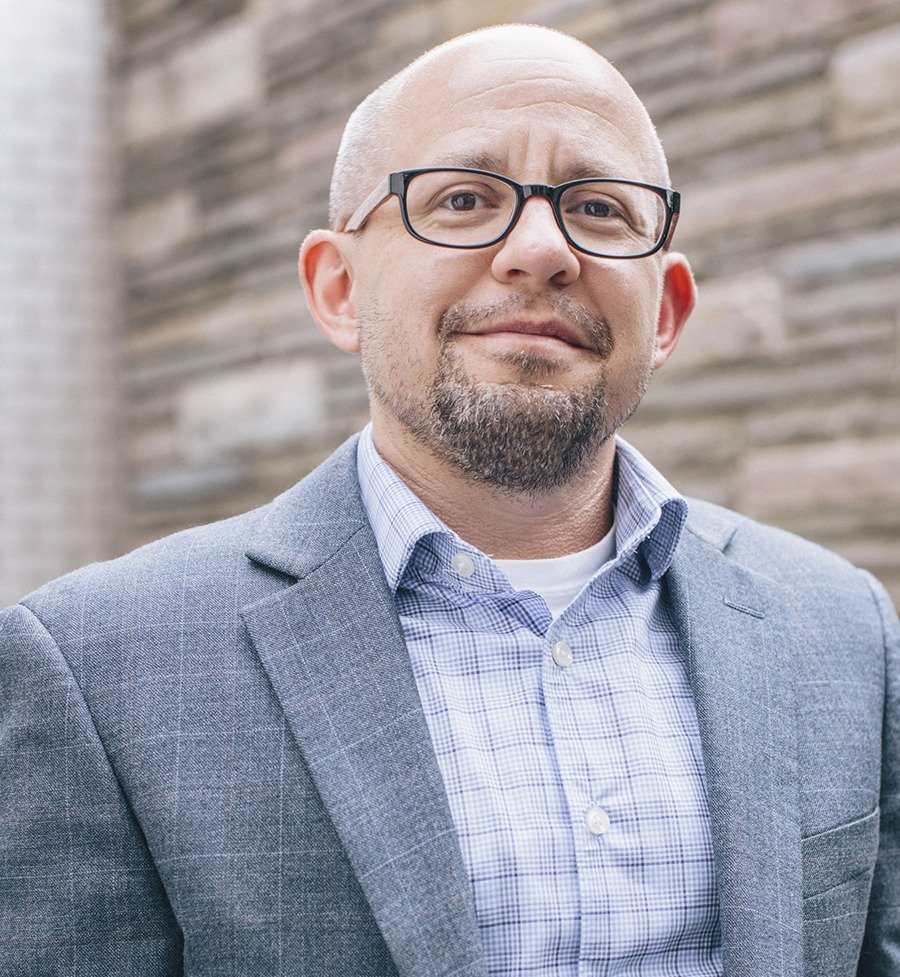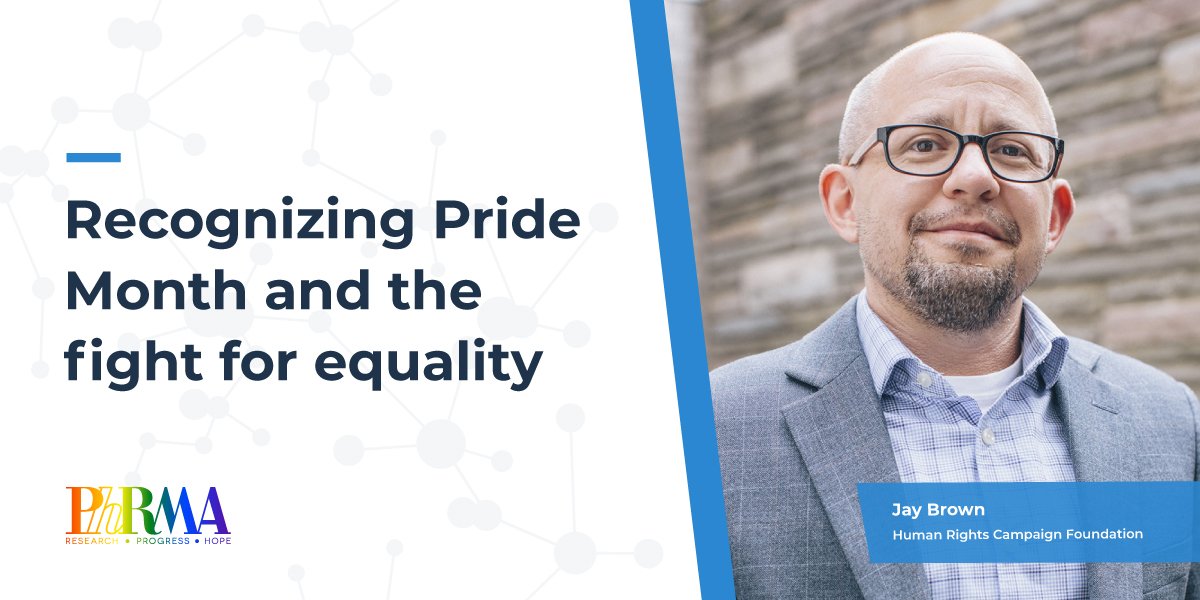 Conversations and healthy debate about issues facing our industry and the health care system are critical to addressing some of today’s challenges and opportunities. The Catalyst welcomes guest contributors, including patients, stakeholders, innovators and others, to share their perspectives and point of view. Today, we are pleased to welcome a guest post from Jay Brown, Human Rights Campaign Foundation's Senior Vice President of Programs, Research and Training on the importance of recognizing Pride Month and the fight for equality for all.
Conversations and healthy debate about issues facing our industry and the health care system are critical to addressing some of today’s challenges and opportunities. The Catalyst welcomes guest contributors, including patients, stakeholders, innovators and others, to share their perspectives and point of view. Today, we are pleased to welcome a guest post from Jay Brown, Human Rights Campaign Foundation's Senior Vice President of Programs, Research and Training on the importance of recognizing Pride Month and the fight for equality for all.
Pride started with protest. At places like the Black Cat, Compton’s Cafeteria and Stonewall, LGBTQ pioneers – led by Black and Brown transgender women – pushed back against police harassment and violence. It’s with this history that we recognized our pride this month and also joined the protests demanding justice for George Floyd, Breonna Taylor, Brianna “BB” Hill and far too many others. It’s with this history we celebrated the Supreme Court victories protecting LGBTQ workers and DACA dreamers. And it’s with this history that we doubled down on the work ahead, as we face the dual pandemics of COVID-19 and racism, which disproportionately impact LGBTQ people of color.
As COVID-19 emerged, the Human Rights Campaign (HRC) Foundation released a research brief warning that the epidemic would hit LGBTQ people, and particularly LGBTQ people of color and transgender people, particularly hard. The HRC Foundation and PSB Research released data bearing out these initial predictions. The LGBTQ community is as diverse as the fabric of this nation. And we have seen time and again that LGBTQ people who sit at the intersection of multiple marginalized identities often face the greatest injustice. It is imperative that we continue to fight for the resources to ensure that communities most impacted can weather this storm.
This work cannot happen without clear and explicit protections under federal law – protections not only for workers but for patients and students and home buyers and jurors. That is why HRC, alongside a broad chorus of nearly 300 corporations like PhRMA, is calling on the U.S. Senate to pass the Equality Act – which would codify comprehensive protections for LGBTQ people under federal law.
We must also do more to create inclusive health care settings, so marginalized people seeking medical help for COVID-19 aren’t being faced with obstacles that others may not face. There are great strides to be made in making every waiting room, doctor’s office, pharmacy and hospital room is LGBTQ-inclusive. That’s why HRC launched the Healthcare Equality Index (HEI) over a decade ago, which PhRMA has also supported over the years. This national LGBTQ benchmarking tool evaluates health care facilities' policies and practices related to the equity and inclusion of their LGBTQ patients, visitors and employees. Our most recent HEI evaluated more than 1,600 health care facilities nationwide. In addition to being a valuable tool and resource for health care facilities, the HEI is used by LGBTQ patients and their loved ones to find facilities that provide equitable and inclusive care.
And because we know that the gap between legal equality and lived equality is profound, it’s why we won’t stop our work in the HRC Foundation to push for changes in policies, practices and hearts and minds. Through our Corporate Equality Index, we’ll continue to push for more inclusive policies for LGBTQ workers. Our Long-Care Equality Index, in partnership with SAGE, will help foster safe communities for LGBTQ elders. Our Welcoming Schools and HBCU programs will build safer school climates for LGBTQ young people. And our HIV & Health Equity program won’t stop their efforts to address barriers to prevention, testing and treatment access until the HIV epidemic – another epidemic that has disproportionately impacted Black and Latinx LGBTQ people – is finally over. Through nearly a dozen programs and initiatives, we will work for LGBTQ people to be valued not just under law, but in our daily lives.
This work cannot happen alone. Together, we can learn, teach, activate and ensure that our most marginalized populations no longer have to fear if who they are or who they love are barriers to their health and safety. Together we can close that gap between legal equality and lived equality once and for all.
An experienced non-profit leader with nearly 20 years of experience, Jay Brown drives the innovative work of the HRC Foundation, the organization’s educational arm. As the Senior Vice President of Programs, Research and Training, he works with a team of professionals who manage HRC Foundation programs -- aiming to ensure equality for LGBTQ people at every intersection of their identities and lives. These programs span a range of issues, including the workplace; children, youth and LGBTQ families; health and aging; HIV and AIDS; religion and faith; and the global LGBTQ movement.



 Conversations and healthy debate about issues facing our industry and the health care system are critical to addressing some of today’s challenges and opportunities. The Catalyst welcomes guest contributors, including patients, stakeholders, innovators and others, to share their perspectives and point of view. Today, we are pleased to welcome a guest post from Jay Brown, Human Rights Campaign Foundation's Senior Vice President of Programs, Research and Training on the importance of recognizing Pride Month and the fight for equality for all.
Conversations and healthy debate about issues facing our industry and the health care system are critical to addressing some of today’s challenges and opportunities. The Catalyst welcomes guest contributors, including patients, stakeholders, innovators and others, to share their perspectives and point of view. Today, we are pleased to welcome a guest post from Jay Brown, Human Rights Campaign Foundation's Senior Vice President of Programs, Research and Training on the importance of recognizing Pride Month and the fight for equality for all.